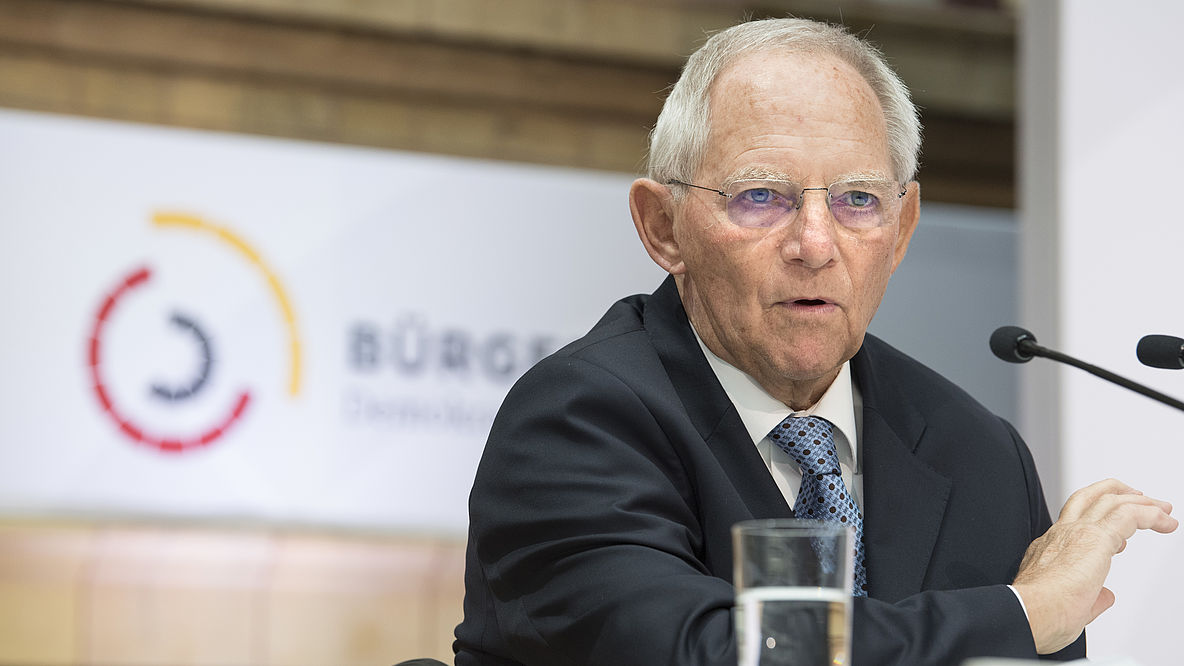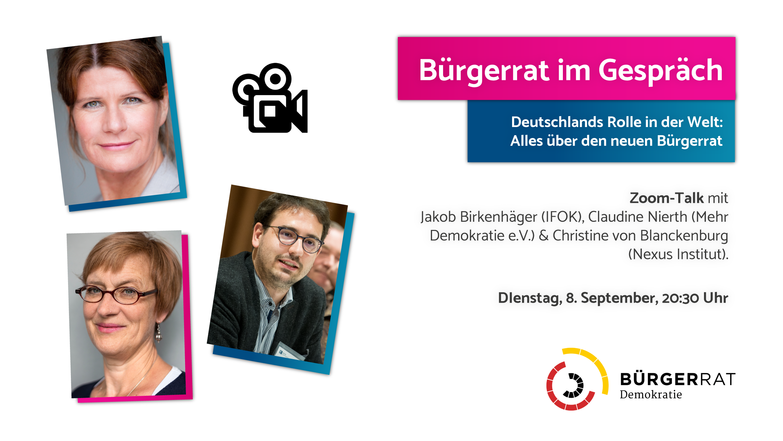New Citizens' Assembly under Schäuble's patronage

A second nationwide sortition-based citizens' assembly will take place in Germany after the "Citizens' Assembly on Democracy". Bundestag President Wolfgang Schäuble will be the patron of a new form of citizen participation in parliament at the new Citizens' Assembly on the topic of "Germany's Role in the World".
The association "Mehr Demokratie" (More Democracy) will organise the Citizens' Assembly, which, in addition to the subject matter, will focus on the further development of the "Citizens' Assembly" format. The association will be assisted by the IFOK, IPG and nexus participation companies as well as the "EsgehtLOS" initiative.
In this citizens' assembly, randomly selected citizens are to discuss and develop recommendations in ten online sessions in exchange with experts. These recommendations will be available in the form of a citizens' report in March 2021 so that they can be discussed in the Bundestag during this legislative period.
"Develop a suitable format"
According to the President of the Bundestag, Wolfgang Schäuble, "in addition to dealing with the aforementioned topic, the main aim is to explore whether such a new set of instruments is suitable for supporting parliamentary work and to develop a format suitable for Germany's conditions at the federal level." If this citizens' assembly, which has been tested as a model project, proves successful, the parliamentary groups could discuss it in the coming legislative period. Then it would be clarified whether it is a forward-looking format of parliamentary democracy and a decision would be made on a possible continuation of this participation instrument.
The concrete questions of the Citizens' Assembly on Germany's role in the world will be fleshed out in advance by MPs in exchange with experts, civil society and selected citizens. The first online meeting of the randomly selected citizens will take place in January.
"Added value for parliamentary groups and parties"
The recommendations of the Citizens' Assembly "provide information on the role Germany can play in the future and the tasks Germany wants, should and must perform. Such recommendations can provide conceptual and action-guiding added value for the political programmes of parliamentary groups and parties," says the concept of the organisers of the citizens' assembly. Sortition-based citizens' assemblies are suitable for identifying solutions that can command a majority in society and thus support political decision-making.
The Citizens' Assembly is accompanied by academics and organisations for foreign and international policy, as well as for international law and, if necessary, other experts. As expert partners of the Citizens' Assembly, the academics will ensure that the preparations and discussions in the Citizens' Assembly reflect the current state of debate and incorporate the findings of research. During the meetings of the Citizens' Assembly, experts, political representatives and stakeholders will be present to provide facts and experiences to the participants and to answer questions if necessary.
The role of citizens
Before the start of the Citizens' Assembly ("agenda setting phase"), randomly selected citizens can propose additions and priorities to the agenda in focus groups. In the citizens' assembly, participants can adapt the agenda if necessary, as far as possible in terms of implementation. For example, they can add to or elaborate on aspects they consider important, invite further experts, or shorten agenda items if they do not consider them important.
After the conclusion of the citizens' assembly, its recommendations will be summarised, explained and published in a citizens' report. The citizens' report will be submitted to the Bundestag in March 2021 and presented to the public.
Referral to the Bundestag
After the citizens' report has been handed over to the Bundestag and all parliamentary groups, the Bundestag has the opportunity to incorporate the results into its work. The Bundestag is completely free to use the recommendations. It would be desirable, depending on the recommendation, to deal with the results in the respective specialised committees. Equally desirable is consultation on the format of citizen participation for the future work of the parliament in the Bundestag.
